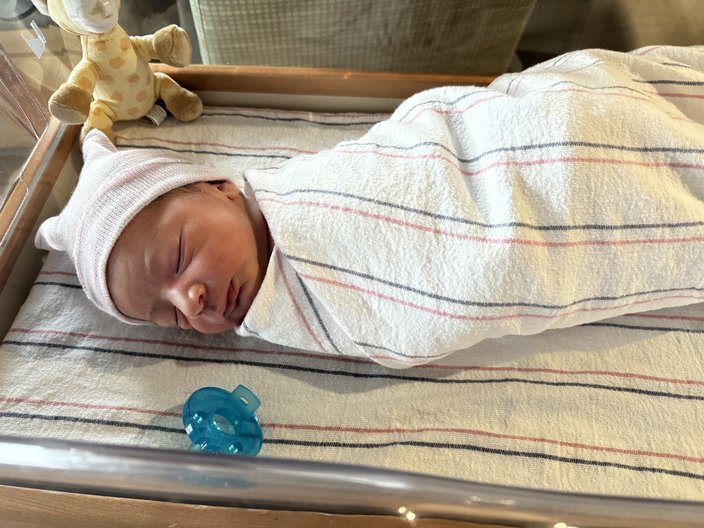
June 13, 2024
 Provided Image/Shanel Gamboa
Provided Image/Shanel Gamboa
Shanel Gamboa, above, simultaneously learned that she and her partner, Roberto Morales, were expecting a baby – and that she had multiple sclerosis. Gamboa benefitted from advanced MS treatment at Penn during her pregnancy.
When Shanel Gamboa's legs started to tingle and go numb last fall, she attributed it to working long shifts as a neuroscience nurse with Lehigh Valley Health Network. But one morning in October, Gamboa couldn't move her legs.
At the emergency room, she not only learned she was pregnant, but that she had multiple sclerosis. Both diagnoses were a shock to Gamboa and her partner, Roberto Morales, a corrections officer.
"When I first found out, I was really sad," said Gamboa, 32, of Whitehall Township, Lehigh County. "I was really depressed. … I'm about to be a mom. How am I going to be a mom? I'm not strong enough."
Although she is a neuro nurse, Gamboa did not have experience with patients who had MS, a disease that can cause numbness or weakness in the limbs, lack of coordination, unsteady gait and blurred or double vision.
"So it was a lot of research on my end, and going from doctor to doctor," she said. "I found myself just jumping from website to website. It was just a really confusing time for me."
Learning that he was going to be a father and also that the woman he loved had a potentially disabling disease, was an adjustment for Morales, 30, but he was able to support Gamboa "100%," she said. "I couldn't ask for a better partner."
His love, and the treatment she was able to access at Penn's MS and Related Disorders Center, under the guidance of Dr. Rohini Samudralwar, a neurologist specializing in MS and women's health, helped Gamboa orient herself to her complex, new situation and remain strong during her pregnancy. She worked until a few days before her June 6 due date.
On June 7, Gamboa gave birth to a healthy baby boy, Roman, who weighed 6.7 pounds.
Shanel Gamboa underwent successful treatment for MS while pregnant and gave birth to a healthy baby boy, Roman, on June 7, 2024.
Multiple sclerosis is an unpredictable disease of the central nervous system that occurs when immune system cells mistakenly attack the protective coating on nerve fibers, gradually eroding them. Nearly 1 million people in the United States live with MS.
No cure for MS exists at this time, but treatments have come a long way with the advent of new therapies. They include ocrelizumab, an infusion treatment that helps ease MS symptoms, prevent relapse and slow the disease's progression. The treatment, sold under the brand name Ocrevus, was approved by the U.S. Food and Drug Administration in 2017.
"In the past, and I think sometimes even now, there's a misconception that if you're pregnant and have MS, you cannot be treated," Samudralwar said.
But research has provided "good safety data" showing that ocrelizumab is "safe for mom and baby," she said.
"They're called disease modifying therapies," Samudralwar said about ocrelizumab and other newer treatments for MS. "Those are preventative to try to make sure that they don't even have a relapse in the first place and accrue disability throughout their pregnancy and beyond."
If MS symptoms flare during pregnancy and go untreated, the mother is at risk of developing a permanent disability, Samudralwar said.
Roberto Morales, left, helped his partner, Shanel Gamboa, adapt to life with multiple sclerosis after they learned of her illness and her pregnancy on the same day. An MS diagnosis doesn't mean people can't live life to the fullest, he says, but they must do it 'a little differently.'
Practitioners increasingly are willing to treat women with MS during pregnancy. Women and men with MS can go through treatment for infertility, and women can safely nurse their infants while undergoing treatment, such as Gamboa's, Samudralwar said.
"Our conversations are significantly more positive than they used to be," she said. "There's more hope in the conversations that we have nowadays than we did before."
After doing research and talking to Samudralwar, Gamboa decided to pursue ocrelizumab infusions.
"I'm still learning every day," Gamboa said. She said she had more days when she felt well as she better learned how her body was responding to the combination of pregnancy, MS and ocrelizumab treatment.
Upon receiving an MS diagnosis, some people may feel that "their life is over," Morales said. "They have that preconceived notion that this is pretty much the ending, that the diagnosis is going to define them and how they live the rest of their life. And I can understand that, because in the very beginning, it's very scary, and everyone's symptoms present differently.
"But I implore everyone to stick with your care team, ... and just keep your head up, because an MS diagnosis does not mean that you can't live your life to the fullest. It just means you have to do it a little differently."
 Provided Image/Shanel Gamboa
Provided Image/Shanel Gamboa Provided Image/Shanel Gamboa
Provided Image/Shanel Gamboa